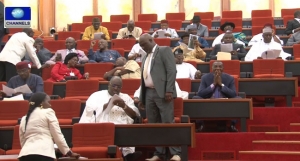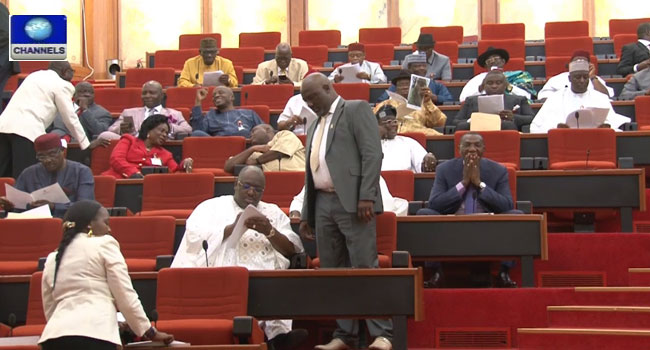
Most Federal lawmakers say the policy document is a fraud, unrealistic and misleading.
Lawmakers on Wednesday deliberated on the MTEF and Fiscal Strategy Paper (FSP) after accusing the executive of sending a document to them that was empty and lacked enough details for lawmakers to deliberate on.
Consideration of the documents that contained President Muhammadu Buhari 2017-2019 MTEF and FSP in accordance with the nation’s Fiscal Responsibility Act began after its details were presented to the Senators by the Deputy Senate Leader Na’Allah.
First to comment on the documents was the Minority Leader, Senator Godswill Akpabio.
He said: “We are looking at assumptions and assumptions might not be correct. Let us forward the documents to the appropriate Committee”.
Senator John Enoh told the Senators that the first thing to consider was the broader provisions of the MTEF and FSP, insisting that the executives must put in place negotiations for peace in the Niger Delta to achieve the 2.2 million barrels per day plan contained in the document.
In the documents the executives had presented different figures that will set the stage for the country’s annual budget.
The MTEF and FSP are proposing a budget that will be predicated on an oil revenue benchmark of $42.5 per barrel between 2017-2019, a Gross Domestic Product growth projection of 3.02%, an average oil projection of 2.2 million barrels per day (mbpd) in 2017, a 2.3 mbpd in 2018 and a 2.4 mpbd in 2019.
It also projects an average exchange rate of 290 Naira per dollar.
Host Of Criticism
But the lawmakers had a host of issues with the projections in the policy document.
Senator Isiaka Adeleke insisted that the 290 Naira per dollar was not achievable and unrealistic while Senator Dino Melaye described the document as ‘a lie’.
“It is not truthful and is not factual. What happened to the 2017 aspect of the MTEF 2016-2018 that was passed last year?
“We must form a level of compliance to the MTEF we passed last year, what is the amendment, is 290 Naira per dollar realistic?” he questioned.
While Senator Foster Ogola told the Senate that the documents were expected to present the real facts and figures of the economy another Senator, Hassan Mohammed, pointed out that the GDP proposed for 2016 was very unrealistic.
“I don’t understand the basis of it. We should look at the MTEF and FSP and tell the executive to urgently look at them. They are unrealistic,” Senator Mohammed stressed.
Senator Sam Anyanwu, on his part, expressed pleasure with the agreement seen between the members of different political parties in the Senate.
“For the first time Senators of both APC and PDP are agreeing that the MTEF and FSP are unrealistic.
“For me, there is no document before us the MTE and FFSP should be sent back to the executive,” he suggested.
Senator Joshua Lidani also suggested that the executives should rework the document before it would be treated by the Senate.
“The Government needs to take the bull by the horn, the Senate should either tinker adjust it or return it.”
Another Senator, Biodun Olujimi said: “The MTEF and FSP has not received the performance of the 2016 Budget to contrast with the 2017 budget.
“This is not what we expected, it is incomplete the MTEF and FSP is Voo Doo oriented”.
While criticisms continued to pour in, in reaction to the proposal of the Executive Arm of Government, some other Senators called for caution and proper consideration of the documents.
Ahmed Sani told the Senate that they could not just sit in the chambers and say that the document was not good.
“As a Certified Economists, I know that the government can do wonders in three months,” he insisted.
Senator Ahmed Lawan stressed the need for the Senate to be very practical “so that at the end of the day we will not worsen the state of things”.
Senator Gbenga Ashafa, who also spoke in support of the MTEF and FSP, urged his colleagues not to just criticise the documents entirely.
After the debate on the issue, Senate President Bukola Saraki appreciated his colleagues for their contributions and gave his opinion on the MTEF and FSP.
“Let me state some guiding principles. The MTEF and FSP are assumptions and estimates. Some are unrealistic. Oil Prices, GDP and Exchange Rates are unrealistic. We have the responsibility to work on it, use our Committees to look at the MTEF and FSP again and turn it around.
“We won’t take documents from the executive and send it back that way. Committees should take the comments of everybody and use it to decide.
“We should take a debate on 2016 budget performance before we do a debate on the report of the Committee,” Senate President Bukola Saraki concluded.
He then asked the Senate if the Medium Term Expenditure Framework and Fiscal Strategy Paper document should be referred to the Committees on Finance and Appropriations for further legislative action and the Senators answered in the affirmative.

